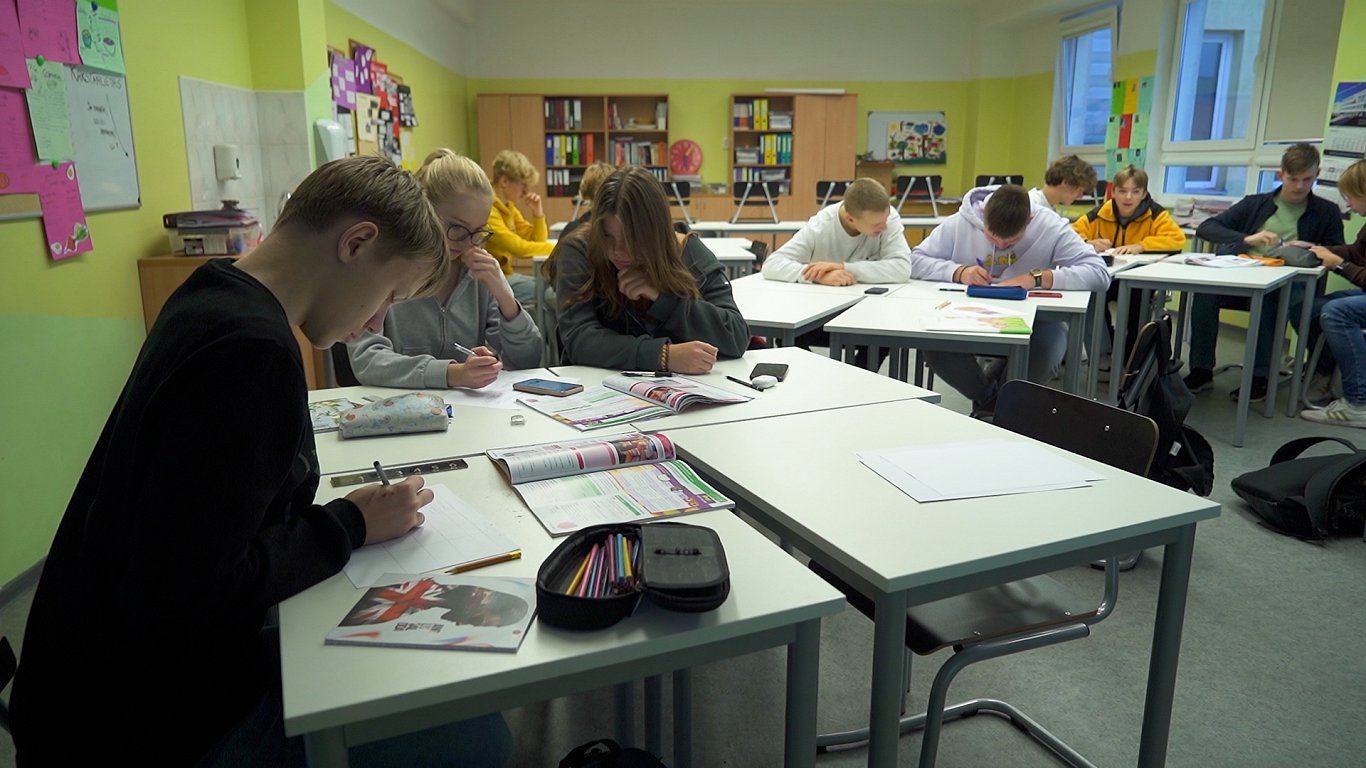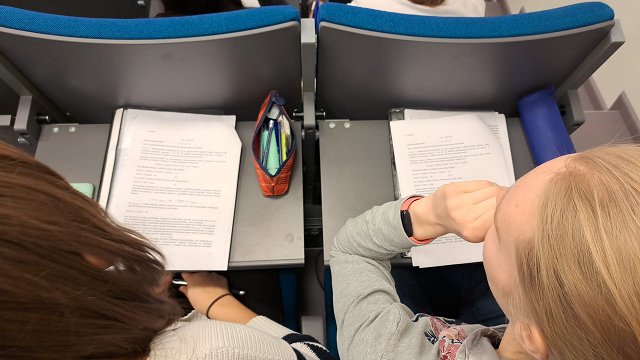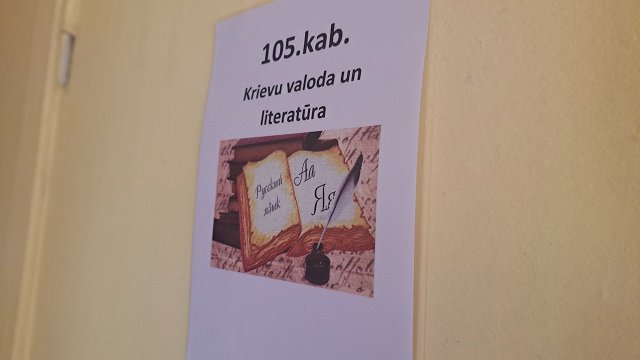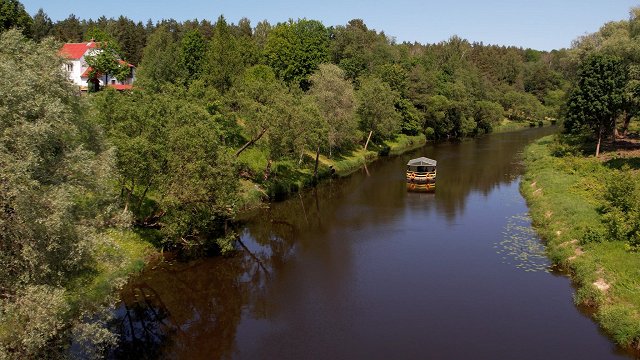The transition to teaching in the official language this year has to take place at pre-schools and years 1, 4, and 7.
Situation at Valmiera 2nd High School
Andrejs Gluhovs, the principal of Valmiera 2nd High School, said about 500 children studied there, both Russian and Latvian-speaking. In the following school year, two parallel forms are planned at years 1, 4, and 7 at the school while the preschool could have around 240 children in 12 groups.
Asked what the school's readiness for change is at this point, Gluhovs said: "It varies, because our readiness is probably almost a hundred percent in principle. Whether the parents, the pupils themselves are ready, is a big question.
"Because they have different knowledge of the Latvian language. Different positions. Different ways they have prepared so far. Because this decision was taken quite quickly. [..] We have already taught more than 70-80 per cent in Latvian from the seventh grade. In three years [transitioning to Latvian only] - it's very fast anyway."
As regards the preschool level, the director said that in the early 2000s, it was decided to organize classes not only in Russian but also in Latvian, and this met resistance.
“It was very, very difficult to prove to parents, and in principle, only a few of the parents have figured out then, ten years later, what an, excuse me, “product” they have received because our graduates were very competitive in the labor market because the knowledge of the language was very extensive. In principle, three languages are fluent. Latvian, Russian, English,” the school principal said.
As one of the biggest challenges at school, Gluhovs considers the ability of teachers to explain everything in Latvian so that pupils understand. Combined with the difficulties already experienced with the much-criticized competencies approach to learning content – Skola2030 – the pace of teaching in Latvian could be slower.
“It will take several years when we can actually enter other tracks, and when children will be able to learn normally and acquire knowledge in Latvian. The level of knowledge could be reduced [..],” said Gluhovs.
According to the director of Valmiera 2nd High School, around 70 percent of teachers in this school institution are Latvian; Valmiera is also a very Latvian-speaking city – according to the latest census results, the proportion of Latvians in this city was 85 percent in 2021.
Situation in Biķernieki primary school
A very different situation is in the municipality of Augšdaugava, Biķernieki civil parish. Of the slightly more than 400 inhabitants, only about a tenth are Latvian, according to data from the Central Statistical Bureau for 2022.
There are fewer than 100 children studying in the Biķernieki primary school, which is celebrating its centenary and in which lessons have been conducted in Russian all this time. Four months before switching to teaching in Latvian, the principal of this school, Aleksejs Mackevičs, said – Latvian is a foreign language in the families of these pupils, but the recommendations “from the sidelines” on how to improve the knowledge of the official language – are not feasible.
“Journals, newspapers, we don't [read], and in principle, we have few newspapers in Latvian available. [Latvian] radio, of course, we don't listen to, or watch TV because it's an incomprehensible language. Unfortunately,” Mackevičs said.
According to the current arrangements, pupils of years 1 to 6 acquire at least 50% of the teaching content in Latvian, while from years 7 to 9 at least 80%. This requirement has been met in Biķernieki primary school, but the transition to teaching only in the official language, according to the current plan, is considered too rapid by Mackevičs.
The director explained that he had managed to find a teacher with good enough Latvian language skills who would work with the first class, but it would be more difficult to work with bigger children in general, Mackevičs estimated.
Therefore, the principal of the Biķernieki school is concerned not only that students' knowledge may be reduced, but also about the possibility of losing colleagues, who might leave their jobs because they are not prepared or unwilling to teach in Latvian.
Ministry promises different types of support
The fact that the readiness to switch to teaching only in the Latvian state is not uniform is also known to the Ministry of Education and Science (IZM). It is not only different across regions but may be different even within one class.
“The level of language skills will be very different for children, well, in the first class. Even if the teacher manages the Latvian language well, of course, it will have to be taken into account that they will work, as we say now, in a linguistically heterogeneous environment,” said Ilze Seipule, deputy director of the Education Department for Education and Science.
There are also concerns about the language skills of teachers themselves, but the Ministry promises support so that teachers can improve their knowledge. Seipule hopes that the teachers will have the desire to do it because different courses have been organized in the past and the turnout has not been great.
In the summer it is planned to offer teachers and pupils not only Latvian language courses and camps but also, in some cases, the possibility of living in a Latvian environment in exchange programs; these opportunities should be looked for in their local government.
Appropriate training materials have also been prepared and a single support system for those whose adaptation will require more effort than others.
“Yes, this support system is meant to be. A methodical support department will also be set up in the National Education Content Center, and in municipalities, we have coordinators, we have thought of a one-stop shop where all this support could come together and be received,” the IZM spokeswoman said.
Another problem is the transition to teaching in Latvian for children in a minority system who acquire knowledge in a special program, for example, for students with learning or mental development disabilities, Seipule said.
Changes in the use of teaching language from September 1 cover 13.6% of preschool students and 23.2% of primary school pupils, according to IZM data.






























